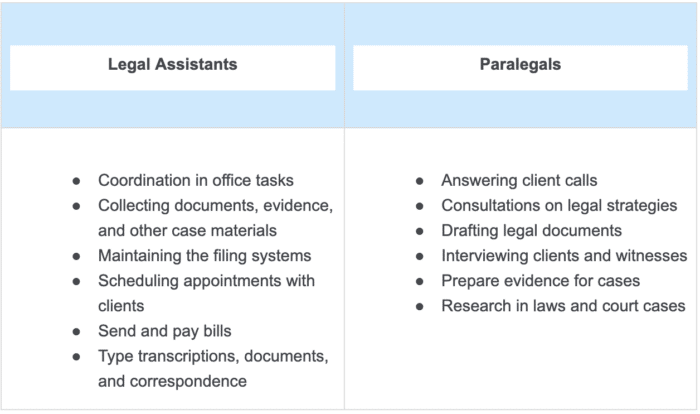It is common to encounter the terms “Paralegals and Legal Assistants,”
and often, people get confused between the two, but they have distinct responsibilities, qualifications, and compensation.
This article will provide information on both job titles, allowing you to determine which one aligns with your interests.
Paralegals Vs Legal Assistants- A Brief Overview
Paralegals and Legal Assistants play a crucial role in supporting the efficient functioning of law firms and assisting lawyers with their work.
Despite their similarities, there are significant differences in their responsibilities, educational requirements, and compensation.
Paralegals undergo more rigorous training than Legal Assistants, allowing them to handle more complex tasks and assume greater responsibilities.
As a result, Paralegals often spend more time on legal proceedings and interacting with clients, while Legal Assistants tend to focus more on administrative and clerical duties.
What is a Legal Assistant?
As mentioned earlier, a legal assistant is required to be involved mainly in the administrative tasks consisting of legal support services. Most of the time, a legal assistant can be easily seen working in a secretarial capacity and doing the following tasks:-
- Answering phone calls
- Scheduling the meetings
- Calendaring important dates
- Typing work
- Submitting documents
In some workplaces, you can see legal assistants do the same work as Paralegals, or sometimes, it may include more clerical duties than that of a Paralegal.
What is a Paralegal?
A Paralegal is a legal professional who typically assists a lawyer in multiple cases that would have otherwise been handled solely by the lawyer. (Read More: What is a Paralegal?)
Essentially, a Paralegal works as a support service to the lawyer, providing various types of assistance, including:
- Researching for the case
- Taking client interviews
- Preparing different documents
- Investigating pieces of evidence
- Talking to the witnesses
Lawyers directly or indirectly depend on Paralegals for their assistance in different cases. Clients also sometimes seek a Paralegal’s advice on several matters regarding a particular case.
Since Paralegals cannot act with as much authority as a Lawyer, they are generally unable to represent a case, offer legal advice, or sign documents that require an attorney’s signature.
(Read More: paralegal vs lawyer)
Legal Assistant vs. Paralegal: Roles and Responsibilities
Considering that Paralegals and Legal Assistants both work to keep law offices functioning smoothly, their roles and responsibilities differ in many ways.
Paralegals have more specialized training and are responsible for more legal tasks such as conducting legal research, drafting legal documents, and assisting in trial preparation.
On the other hand, Legal Assistants tend to focus more on administrative and clerical tasks such as managing calendars, organizing files, and drafting correspondence. Overall, Paralegals have more responsibility and autonomy in their role compared to Legal Assistants.
For both roles separately, the duties may depend upon the size of the law firm. In large law firms, every lawyer has their own legal assistant, whereas small law firms recruit only one legal assistant for the whole firm.
For Paralegals in small firms, they might have to fill in a lot of hats, however, in large law firms, there can be many Paralegals covering a single aspect, such as conducting research or filing motions.
If you want to know more about the job duties of a paralegal, click here to learn more about what do paralegal do.
Read more on Types of Law Paralegals here.
Paralegal vs Legal Assistants: Education
Legal Assistant Education
While there are no formal education requirements to become a legal assistant, completing a short-term legal secretary program can be helpful.
In a legal secretary training program, you may study topics such as filing systems, legal terminology, office technology and software, and transcription.
This can provide you with a foundation of knowledge and skills to begin your career as a legal assistant.
An associate degree or grad certificate in legal studies would be best if you look out for taking more specialized legal tasks.
Also see: Paralegal Specializations
Paralegal Education
Paralegal requirements may differ from employer to employer. An associate Paralegal Degree is a great option if you want to be credible.
Another great option is to get a degree in any honored arts subject and then earn a certificate in paralegal studies.
Topics generally studied in paralegal programs include:
- Case investigations
- Criminal law
- Law office practices
- Legal research
Getting certified as a paralegal after completing your program may also increase your job prospects. If you enroll in online paralegal programs, you can complete your education faster.
(Read More: How Long Does it Take to Become a Paralegal)
Legal Assistant vs Paralegal: Certifications
If you are interested in earning credentials as a certified legal assistant, NALS, the Association for Legal Professionals, is a good option.
Many applicants qualify for this exam based on their work experience, but graduating from an American Bar Association-approved program can reduce the experience requirements.
For Paralegals, there is also a credentialing option through the Certified Paralegal (CP) program offered by NALA, the Paralegal Association. (Read More: Paralegal certification)
Both education and experience can qualify you for the credentialing exam. A straightforward option is to choose a paralegal school that is approved by the ABA, but some colleges and universities offer accelerated paralegal programs that allow you to complete your education requirements more quickly.
Additional Resource: Paralegal certificate online
Legal Assistant vs. Paralegal: Skills
Personal strengths can be a determining factor when choosing between a career as a legal assistant or a paralegal. Legal assistants are primarily responsible for administrative tasks, while paralegals focus on legal duties and assist lawyers with research.
However, there is some overlap between the two positions, and their skill sets may have some similarities.
Let us look at the difference between paralegal skills vs legal assistant skills.
Can Paralegals Give Legal Advice?
Paralegals are not authorized to give legal advice or represent clients in court. However, they can assist lawyers in preparing legal documents, conducting legal research, and managing client relationships.
They also play an important role in ensuring that all legal procedures are followed correctly and that clients understand the legal process.
Is a Legal Assistant the Same as a Paralegal?
Indeed, the terms Legal Assistant and Paralegal are often used interchangeably, but they are not the same thing.
The American Bar Association recently updated its definition of paralegals and no longer considers “legal assistant” as an equivalent term.
Paralegals work directly with attorneys on various legal cases, while Legal Assistants generally handle administrative tasks. Job duties can vary from one workplace to another.
Who Makes More, Paralegal or Legal Assistant?
As compared to legal assistants, Paralegals do earn more, and they are often given greater responsibilities. With a median annual salary of $52,920, the Bureau of Labor Statistics classifies paralegals and legal assistants into one job category. The ones having more experience earn over $85,160. Here’s more on Paralegal Salary
Legal Assistant or Paralegal – Which Is Right for You?
Working as a paralegal might be a good fit for you if you want to be more involved in case preparation. However, if you are more inclined towards administrative duties, then a legal assistant job would be best for you.
It’s not necessary to have a law school degree for both of these roles, and you can freely work while having some in-demand skills.
To find the paralegal or legal assistant training program that best suits your needs, you can begin looking into accredited schools right away.
Conclusion
In summary, while paralegals focus more on legal research and case involvement, legal assistants provide crucial administrative support in law offices.
Both roles are vital, each demanding specific skills that contribute to the success of legal operations. Understanding these differences empowers individuals to choose a career path that suits their strengths and interests in the legal field.
Here are a few Paralegal careers you can consider:
- Immigration Paralegal
- Litigation Paralegal
- Real Estate Paralegal
- Nurse Paralegal
- Remote Paralegal
- Corporate Paralegal
- Criminal Law Paralegal
- Family Law Paralegal
- Divorce Paralegal
- Intellectual Property Paralegal
Related Resources:
Related Articles
-
How to Be Successful in College in 2022 – 7 Simple Tips to Succeed
-
How Do Scholarships Work? Read This First…Truth is Shocking
-
7 Best College Majors 2024: What Should I Major In?
-
How to Choose a College – 10 Things You Must Consider in 2024
-
Why Go to College? Top 13 Benefits for Adult Students in 2022
-
Top 5 Best Alternatives to Community College for 2024










